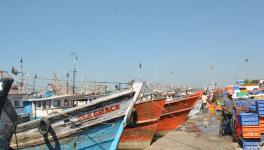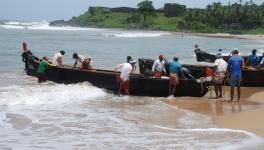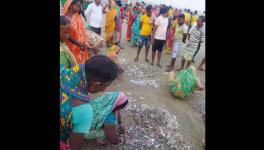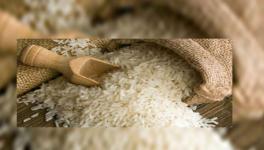Formalin Controversy Dents Fisherfolk’s Revenue
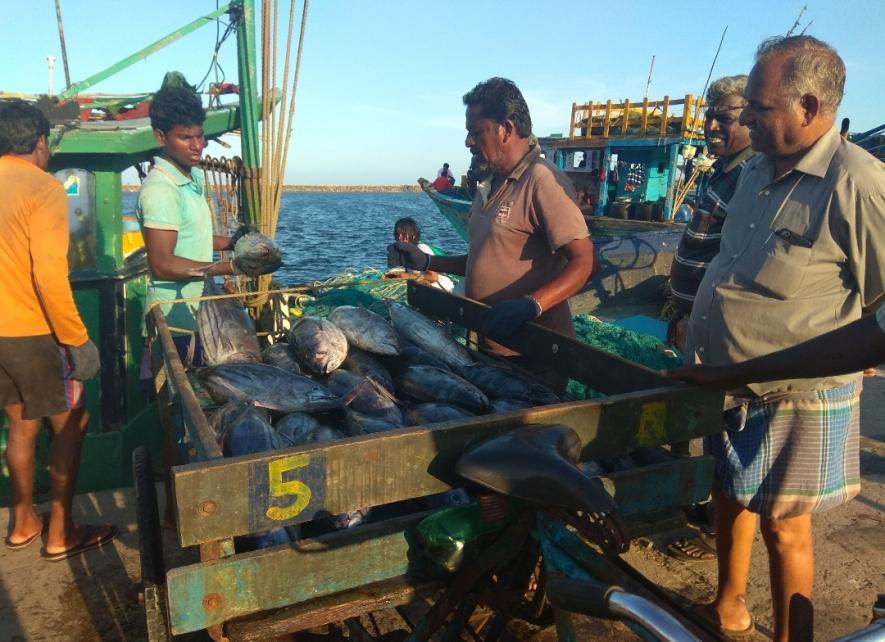
Fishermen offload their catch at the Kasimedu Harbour in Chennai. Photo: Bharathi S.P.
Chennai’s usually busy fish markets saw barely any customers over the last weekend as news of the carcinogenic formalin being found in fish samples scared customers away. Formalin is usually used to make fish stocks appear fresh even when they have gone stale. In 2011, the formaldehyde (of which formalin is a solution of) was banned by the Food Safety and Standards Authority of India (FSSAI).
In recent times, the issue has come to the fore in many States. In Tamil Nadu, the Tamil Nadu Dr. J. Jayalalitha Fisheries University recently tested fish samples from the two popular fish markets of Kasimedu and Chintadripet with a low-cost formalin detection kit. The Hindu reported that out of the 30 samples, 11 tested positive. Nearly 5-20 parts per million (ppm) of formalin were found in freshwater and marine fishes. Formalin is harmful to the kidneys, liver and can cause irritation in the eyes, throat, stomach and skin. Sura (shark), octopus and paarai were some of the varieties affected by formalin contamination. However, Fisheries Minister D. Jayakumar said that the tests conducted by the government proved negative.
Fishermen’s groups in Chennai however said they had nothing to do with the addition of the chemical and saw a conspiracy behind the decline in sales. They added that there was no need for them to preserve the fish as most of it got sold immediately while the remaining was dried or used as chicken feed or manure.
The issue appeared on the national horizon last month when the Food Safety Department in Kerala seized 6,000 kg of fish that was allegedly contaminated with formalin. Kerala is the biggest player in the industry owing to the high degree of mechanization in the sector and the number of export permits. A large amount of fish from the coastal States is sent to Kerala from where it is exported to foreign countries. “In Tamil Nadu, only the rich industrialists can export so the smaller players send their produce to Kerala. After this issue came out, the sector in Kerala has been badly affected,” said K. Bharathi, South Indian Fishermen Welfare Association. The entry of fish from other States was banned in Meghalaya, Goa and Assam after the formalin tests
National Fisherworkers Forum General Secretary T. Peter said that it was following many complaints received by the government that the Kerala State Food Safety Department had conducted the tests. The search is good for the consumers. “However, fishermen don’t use formalin. Traders across the country use formalin or ammonia to preserve the fishes. Generally, we use ice but traders tend to use ice with formalin. Consumers have stopped purchasing fish because they are confused. To fight against this, we are ready to join hands with the government. The health department should point out the good from the bad. There can be search operations conducted by the government in checkposts. Fishes contaminated with formalin come to Kerala from other States and the search can help to reduce the contamination,” said T. Peter.
According to Mr. Bharathi, many fishermen weren’t aware about the use of formalin before the investigation. His association is demanding the arrest and interrogation of those who sold these fishes, as well as restriction on the sale of formalin. He also perceived a conspiracy in the issue “I strongly believe multi-national corporations have a role to play in this. The formalin contamination is a planned act. MNCs want people to say that the fishes are contaminated so that they can create an alternative market for branded frozen and tinned fish. Why has an issue of national concern come out so late? The MNCs want fishermen to remain as daily wage labourers. I can say that no small-scale fishermen can access formalin,” said Mr. Bharathi.
Exporters too deny any knowledge of the issue. “As far I know, exporters do not use formalin. It can’t be added in fishes meant for export as meat products need to pass 14 tests before they are dispatched. If the authorities find chemicals, the fish will be stopped then and there. Only ice chips can be used to freeze and preserve the fish,” said Senthil, fish exporter.
Amid the back and fro, fishermen last week saw revenues decline. A kg of seer fish that was earlier sold between Rs. 600-700 is now sold for only around Rs. 300-400 in Chennai. Fisherfolk around Chennai have suffered successive blows in recent time. In 2017, sales dipped after the collision of two vessels - the BW Maple and the oil tanker Dawn Kanchipuram - led to an oil spill off the coast of the city. In April and May, there was a ban on operations so as to allow the breeding of fishes. It was only last month that fishing resumed in full swing and now, members of the community rue having to contend with another issue.
Get the latest reports & analysis with people's perspective on Protests, movements & deep analytical videos, discussions of the current affairs in your Telegram app. Subscribe to NewsClick's Telegram channel & get Real-Time updates on stories, as they get published on our website.











